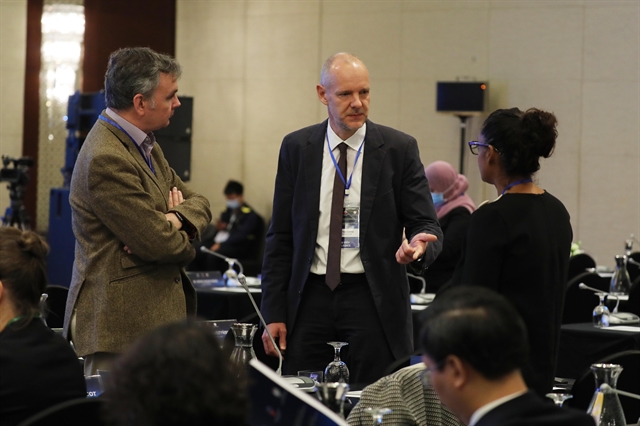 Politics & Law
Politics & Law

One of the bright spots in the East Sea (internationally known as South China Sea) tension this year is that many countries have clarified their legal stance in the sea through diplomatic notes exchanged at the United Nations, said Dr Phạm Lan Dung, acting director of the Diplomatic Academy of Việt Nam on Monday.

|
| Foreign experts and scholars exchange views on the sidelines of the conference. —VNA/VNS Lâm Khánh |
HÀ NỘI — One of the bright spots in the East Sea (internationally known as South China Sea) tension this year is that many countries have clarified their legal stance in the sea through diplomatic notes exchanged at the United Nations, said Dr Phạm Lan Dung, acting director of the Diplomatic Academy of Việt Nam on Monday.
Addressing the 12th South China Sea International Conference themed “Maintaining peace and co-operation through times of turbulence”, Dr Lan said ASEAN continued to demonstrate its centrality and cohesiveness in the region against challenges, in relevance to ASEAN 2020’s theme “Cohesive and Responsive”.
“The East Sea continues to attract the attention of the international community. Many countries have affirmed the importance of peace, rule of law, freedom of navigation and aviation in the sea,” she said.
Vietnamese Deputy Minister of Foreign Affairs Bùi Thanh Sơn said the East Sea situation faced a number of unpredictable challenges that affect regional peace, stability and co-operation, including issues such as unilateral interpretation of international law which is inconsistent with standards and common interests of the international community. Geopolitical competition among powers and the militarisation in the East Sea have made the situation more complicated and hindered efforts to promote dialogue and co-operation. In addition, non-traditional maritime security issues are getting more complex, affecting the peaceful lives of millions of people.
"The parties need to uphold dialogue, strengthen co-operation for development and seek peaceful solutions to address differences and disputes in the East Sea on the basis of respecting international law with the aim to turn the East Sea into an area of connection and collaboration instead of competition and confrontation," he said.
He called for peaceful settlement of overlapping claims in the sea in accordance with international laws, especially the 1982 UN Convention on the Law of the Sea (UNCLOS).
The Deputy Minister also urged parties to deepen co-operation in natural resource protection and strengthen marine scientific research and sustainable development in the East Sea.
ASEAN member states must reach a consensus on a shared strategic approach for regional marine security and create favourable conditions for ASEAN and China to soon complete the negotiation of the Code of Conduct in the South China Sea (COC), he said.
International experts at the conference shared a common view that the COVID-19 pandemic does not impact China’s behaviour in the East Sea. They predicted that 2021 would see a higher level of tension in the sea.
Dr Euan Graham, senior fellows for Asia-Pacific Security, International Institute for Strategic Studies and former Executive Director of La Trobe Asia, La Trobe University, Australia, said: “In the short term, COVID-19 has preoccupied regional governments, taking attention away from China's encroachments in the South China Sea. But in the longer term, I think the pandemic could have weighty consequences for how Southeast Asian countries approach national security and weigh their relations with Beijing, especially if China succeeds in quickly rolling out a viable vaccine.”
Bilahary Kausikan, former permanent secretary of Singapore's Foreign Ministry believed that the South China Sea and the COC regulate Chinese behaviour in the South China Sea. But COC “is not a legally binding document” and “should not act as a political constraint on other countries around the region, who have interests in the South China Sea”, he said, adding that the COC should also not act as a constraint on any ASEAN member state’s relationship with any country outside the region.
The 12th South China Sea International Conference would continue on Tuesday with a special session held for the first time where young leaders from the region and extra-regional countries will share their thoughts and outlook on the East Sea. — VNS




